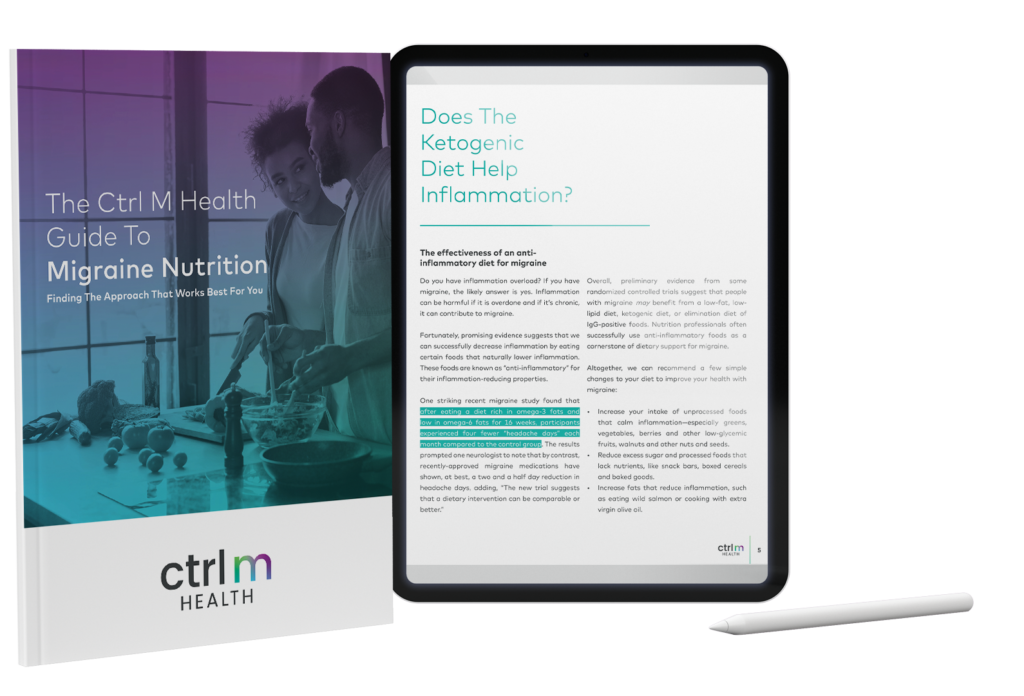Too busy for breakfast this morning? Thinking of slimming down via intermittent fasting? Maybe you’re going paleo or keto, doing the Whole30 program, or some other restrictive diet plan. Know this first: your migraine brain probably won’t like it. So what’s the migraine diet, if there is one?
The migraine brain loves consistency. It’s happiest in a cozy state of homeostasis — when the body is in balance — and hates sudden change. That’s because the migraine brain is wired to overreact to changes in the body’s internal or external environment. Ordinary events that have little effect on other people can send the migraine brain reeling. Among these, dehydration, fasting, and improper nutrition are prime culprits. Luckily, however, these are three factors well within our control.
Dehydration and Migraine
Drinking enough water is the secret weapon for a well-functioning brain. The brain is about 75 percent water. Water is present both inside and outside the cells, bringing in nutrients and flushing out toxins. A hydrated brain is one at the top of its game, able to keep itself and the whole body running smoothly.
Can dehydration cause headaches? The evidence tells us that even mild dehydration results in a loss of concentration and cognitive ability, as well as increased fatigue. For people with migraine, this imbalance also paves the way for an attack.
Dehydration is often overlooked when it comes to migraine; perhaps drinking water seems too simple an act to help with such a complex neurological condition. But in fact, giving your brain the hydration it needs is an enormous protective factor for headache.
-
 Women generally need 11.5 cups of water a day and men need 15.5 cups. Everybody is different, so your optimal amount will differ. When in doubt, let thirst be your guide.
Women generally need 11.5 cups of water a day and men need 15.5 cups. Everybody is different, so your optimal amount will differ. When in doubt, let thirst be your guide.- Vegetables and fruits have high water content and contribute toward your daily water goal.
- Sugary drinks and salty broths work against you, because they push water out of your cells.
- Most people can replenish their fluids through drinking and eating, but extreme cases — for example, a dehydrated person whose migraine attack brings on vomiting — may need intravenous hydration in the emergency room.
Fasting and the Migraine Diet
You might have heard the myth that intermittent fasting helps migraine, but nothing could be further from the truth. The research shows that going for a long stretch of time without food is a definite migraine trigger, including those fasting for religious occasions like Ramadan or Yom Kippur. A body can go for about 15 hours without food before seeing negative effects like headache, dizziness, or fatigue. But for someone with migraine, the limit is about 12 hours. Fasting sets you up for migraine by disrupting your homeostasis in four different ways:
-
- Blood glucose levels swing erratically, negatively affecting the brain
- Hydration levels plummet
- Hunger sends alert signals to the brain, leading to disrupted sleep
- Muscles tense when we’re hungry, which also promotes migraine
These principles also apply when you skip meals. Remember, the migraine brain likes consistency more than anything, and that goes for maintaining consistent blood sugar levels as well. So when you put off your “break fast” after not eating all night, or skip lunch because you don’t have time, you’re robbing yourself of protective factors. Do your brain a favor by eating regular meals and healthy snacks.
The Care Tuner Guide to Migraine Nutrition
Research shows that the types of foods we eat, and when we eat, have an impact on our migraine. Our new eBook helps you understand the link between migraine and nutrition.

“Dieting” for Migraine Health
Maintaining a healthy weight is important for controlling migraine. But that’s not the same as “dieting,” which is bad for migraine. Any diet meant to achieve quick results will often involve a sudden, extreme change in your eating habits, creating a massive shift in your change-averse brain.
This is the same brain that objects to even a 2 percent reduction in water intake — it’s not going to like being abruptly deprived of food. What aggravates your brain even further is that these diets are difficult to stick with, making any weight loss often fleeting. The yo-yo effect of rapidly losing and gaining weight back further disrupts your homeostasis.
So what’s the migraine-safe way to reach and maintain a healthy weight? Through slow, steady and patient change — just the way your brain (and body) likes it.
-
- Balanced nutrition. Nutritionists recommend reducing your meal portion sizes and eating healthy, balanced meals that include protein, fiber, and whole grain.
- Plenty of water. Sometimes we think we’re hungry when we’re actually thirsty.
- Regular workouts. Mild exercise helps regulate your appetite and elevate your mood.
- Healthy sleep. Sleep deprivation is associated with weight gain, probably due to hormone regulation issues.
- Emotion management. Taking control of our eating habits sometimes means examining why we eat. Does it tie into emotional or mood issues? Talking to a therapist can help.
If you’ve noticed, there’s an added bonus to the healthy diet steps listed above. Each one is also a protective factor for migraine.
When you develop a consistent routine that involves any of those steps, you’ll be building your resistance to migraine and moving toward a healthy weight that’s sustainable in the long run. It’s like getting two for the price of one! Let’s raise a glass of water in a hydrating toast to your good health.
Learn some helpful migraine nutrition strategies in this article? Find out how to put them to use in your daily life with “The 4-Step Guide to Migraine Nutrition.”





